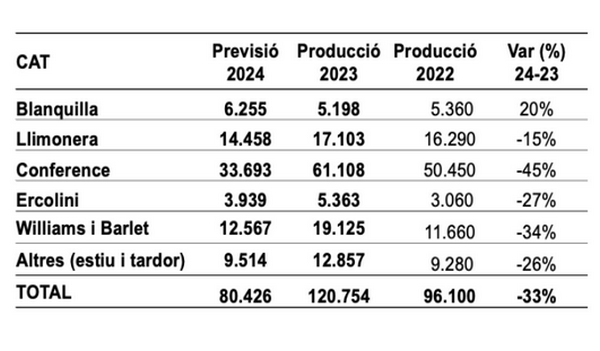According to data shared recently by Afrucat, the Catalan Fruit Business Association, and the DACC, the Department of Climate Action, Food and Rural Agenda, Catalonia could lose 33% of its entire pear production next season, with a total volume estimated at 80,426 tons.

The data to be presented at the Interpera congress on June 27 in Portugal reveal an overall decline in all varieties, with the exception of the Blanquilla pear, which is recording a 20% increase compared to last season, when it had suffered a drop.
This drop in the production is largely due to the consequences of the drought in spring 2023 and the heat of last summer and this winter. The stress suffered by the pear trees at certain times because of drought, especially in the pre-harvest period, triggers problems in the following year's flower induction. This has resulted in a more limited flowering and poor fruit setting, which has led to plenty of physiological drop.
By varieties, the Conference (which is the main pear in the area) has been the worst hit by the adverse climatic conditions. Its production will drop by almost 45%, with a harvest estimated at 33,693 tons, compared to last year's 61,108 tons.
According to Joan Serentill, president of Afrucat's pome fruit group, "this will be a year for us to regain lost ground in the domestic market. We are expecting pears with good sizes and good quality and the Spanish market is the one that most appreciates these large, sweet pears. Our exports will likely fall and Italy, which is our main destination, will certainly feel this lack of shipments."
Serentill also says that this drop in the production is bad news when it comes to stimulating the consumption of pears and fruit in general, which has been declining for years. "Pear consumers are getting older and our challenge is to reach younger consumers and make pears a trendy product in their minds. We have to make young people fall in love with our pears."
Manel Simon, Managing Director of Afrucat, says: "We believe that this should be a good season for the growers. We expect this downturn to occur not only in Catalonia. There will be a generalized shortage of some pear varieties on the market, which should allow fruit growers to get nice prices for their crops."
Carmel Mòdol, Secretary for Food in the Department of Climate Action, Food and Rural Agenda of Catalonia, says he is convinced that this season's conditions should lead to acceptable prices being paid for the pears and to growers obtaining adequate yields. "We have an increasingly better organized market with quality production available, so we hope to leave the crises of recent years behind."
It will still be necessary to keep an eye on how meteorological phenomena evolve in the current context of climate change, to evaluate the need to switch to varieties that are less sensitive and more adaptable.
 First Initial pear harvest estimates. Catalonia 2024 (Source: Afrucat, June 2024)
First Initial pear harvest estimates. Catalonia 2024 (Source: Afrucat, June 2024)
Evolution of the pear market in Europe
A few years ago, the main European pear producer was Italy, with approximately 900,000 tons, followed by Spain with around 650,000 tons, but in recent years, these countries have lost more than half of their production potential to the Belgium-Dutch tandem. These two emerging countries, which are specialized in Conference pears, have doubled their productions and gone from 200,000 tons each to 400,000 tons since 2000.
Portugal, with its Rocha pear, has also managed to surpass France and, with a production potential of around 200,000 tons, is now the fifth-largest pear producing country in Europe.
 For more information:
For more information:
Afrucat
C/ Corregidor Escofet, 64
25005 Lleida - Spain
Tel.: +34 973 22 01 49
www.afrucat.com
